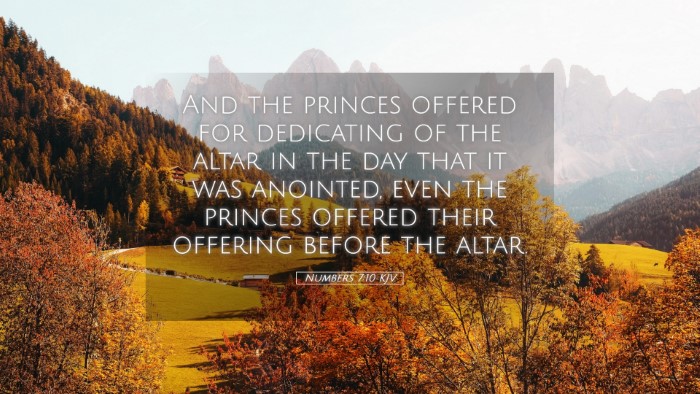Commentary on Numbers 7:10
Numbers 7:10 reads: "And the leaders offered for the dedication of the altar on the day it was anointed, and the leaders offered their offerings before the altar."
This verse is situated within the narrative of the Israelites' journey through the wilderness, underscoring the importance of leadership and communal worship in establishing the sacred space of the altar.
Contextual Overview
The book of Numbers is distinct in its aim to document the pivotal moments during the Israelites' wanderings, particularly as they prepare to enter the Promised Land. The dedication of the altar signifies a profound moment of worship and communal identity.
Insights from Public Domain Commentaries
Matthew Henry’s Commentary
Matthew Henry notes that this chapter serves as a transition point: "As they are about to settle in a new land, the importance of securing God’s favor through rituals cannot be overstated." He reflects on the symbolism of the offerings, highlighting that they represent the dedications of the hearts of the leaders to God’s service.
Henry emphasizes the collective nature of this offering, stating, "It was not just the physical gifts that mattered, but the unity it fostered among the tribes and leaders, aligning them under God’s authority."
Albert Barnes’ Notes
Albert Barnes provides a deeper look into the cultural and theological implications of the offerings. He explains, "This was a formal act of dedication, indicating that leadership in the camp included spiritual responsibilities." Barnes asserts that such leadership must always seek to honor God in collective worship. He observes that the leaders’ willingness to offer sacrifices reflects their roles as intermediaries between the people and God.
He further states, "The offerings also serve not only to uplift their devotion but remind the community of their dependence on God’s grace.” In doing so, Barnes elaborates the importance of sacrifice, which bonds the worshippers together in a unified mission.
Adam Clarke’s Commentary
Adam Clarke brings attention to the detailed descriptions of the offerings made by each leader. He notes, "Each offering, although identical in type, was unique in its significance as it represented the individual tribe’s identity and commitment to God.” Clarke describes how each tribe’s offering underscores their purpose and covenant with the Lord.
He further explains that the ritualistic aspect of their offerings was designed to teach future generations about "the importance of reverence in worship and the principle of sacrifice in maintaining covenantal relationships.” Clarke articulates that this “sacred act of giving” reflects not only their immediate needs but anticipates their future responsibilities as a nation.
Theological Reflections
This verse invites readers to reflect on the themes of leadership, community, and devotion to God. The act of offering at the altar illustrates several critical elements:
- Leadership Responsibility: Leaders set the tone for worship and sacrifice. The offerings symbolize a shared commitment to God’s directives.
- Community Cohesion: The communal aspect of these offerings portrays unity among the tribes as they collectively dedicate themselves to God.
- Covenantal Relationship: The act of offering highlights the unbroken bond between God and His people, carried out through worship practices.
Practical Applications
For pastors and church leaders today, this passage holds multiple practical applications:
- Encouraging Collective Worship: Pastors can cultivate a culture where offerings—be it resources, time, or talents—are offered collectively to signify unity.
- Modeling Sacrificial Leadership: Leaders should exemplify sacrificial giving in all areas of ministry, encouraging others to follow suit.
- Teaching the Value of Worship: Regularly engage congregations in discussions about the meaning and importance of worship and offering.
Conclusion
Numbers 7:10 stands as a testimony to the worship life of a community facing unique challenges as they venture into a new land. The leaders’ offerings not only fulfill a ritualistic obligation but reinforce vital lessons about leadership, unity, and dependence on God.
As pastors, students, and scholars continue to ponder over these profound lessons, let us move forward with a deepened understanding of our roles — embracing collective worship and recognizing our identities as dedicated servants of God.


